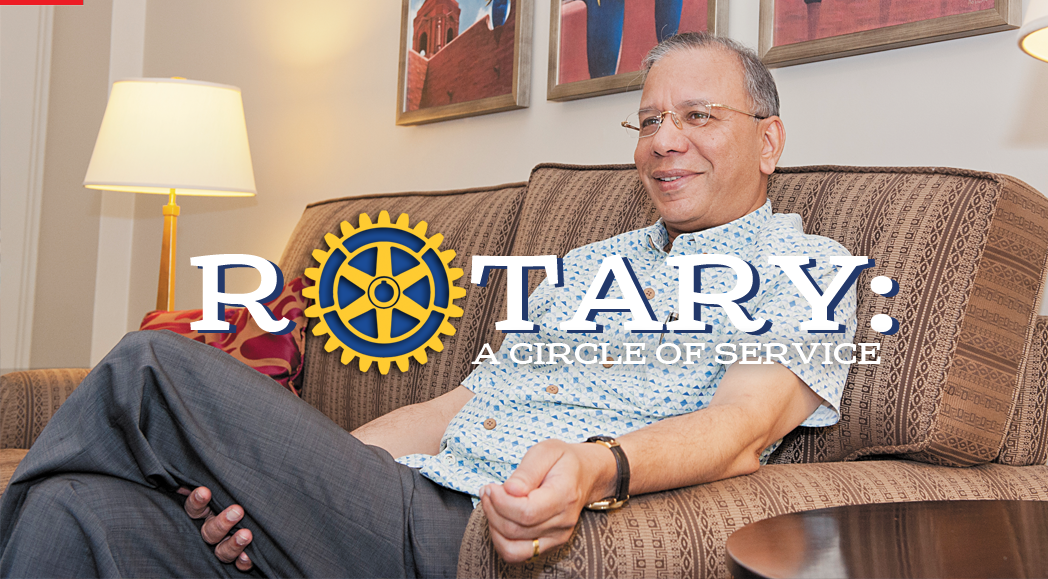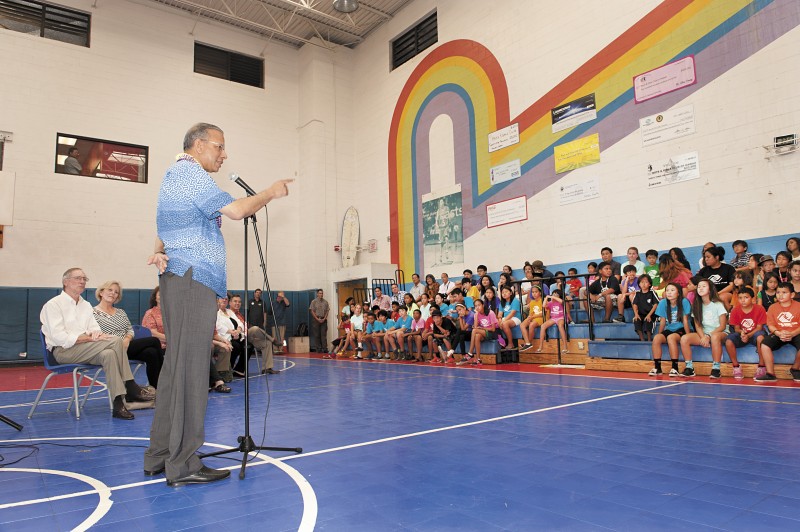100 Years For Hawaii Rotary
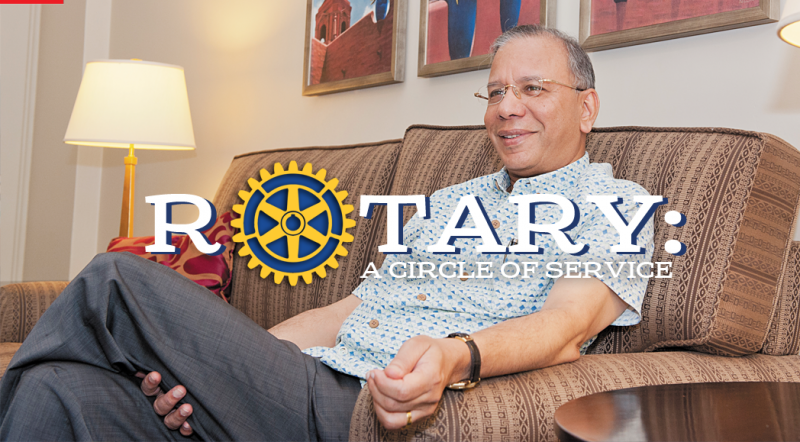
As Rotary celebrates 100 years in Hawaii, the club’s international president stops in Hawaii to offer congratulations and to check on some of local Rotarians’ service projects.
The Rotary Club, which celebrates its centennial in Hawaii this year, derives its name from the fact that club meetings would rotate from business to business each month in its hometown of Chicago.
But in looking at its 100 years of service in the Islands, it may better be thought of as the rotation of an enormous circle of good deeds that begins when you help another without looking for anything in return.
“No one is ever successful without a hell of a lot of people supporting him. I get very annoyed when someone says ‘self-made man,’” say K.R. Ravindran, president of Rotary International, who was in town last week to mark the centennial of the Hawaii chapter.
“The only self-made person is God,” he continues. “Every person was made because someone, somewhere helped him. Someone gave you money or your parents sent you to school or nurtured you when you were sick. Rotary allows you to pay back what others have done for you. If I give you a glass of water, you cannot repay me by simply giving me back a glass of water. You often don’t have a chance of returning favors done for you. I often do others favors, and the only thing I say in return is go help someone else.”
Locally, Rotarians boast a “Service Above Self” mantra that can be seen in programs such as the Visitor Aloha Society of Hawaii (VASH), the Children’s Justice Center and WeVoteHawaii. They conduct vision testing in schools, cleanups at parks, and this year, to celebrate their anniversary, Rotarians are renovating the Boys & Girls Club Charles C. Spalding Clubhouse gym to the tune of $150,000, and were pleased to have Ravindran come and visit the facility.
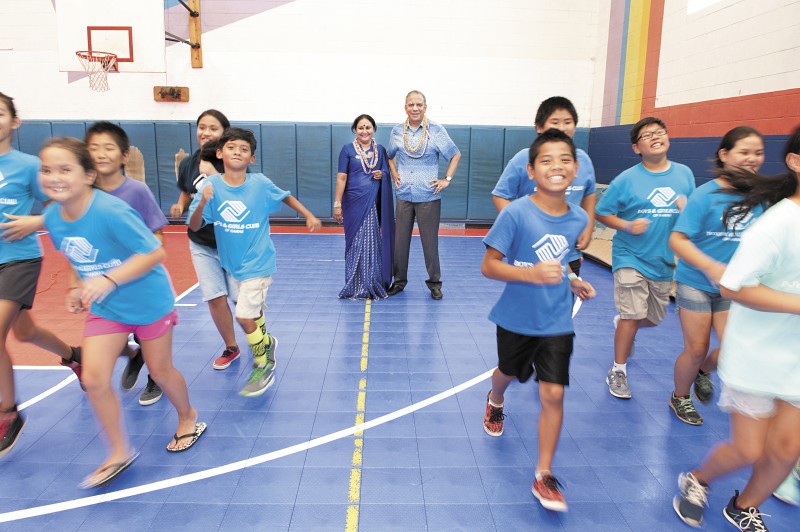
Rotary International president K. R. “Ravi” Ravindran and wife Vanathy were delighted to spend an afternoon at the
Boys & Girls Club Spalding Clubhouse, which local Rotarians are renovating. Photo by Nathalie Walker.
“It is an honor to have him here,” says Del Green, Rotary district governor of Hawaii. “It is a short visit but very meaningful, as he is a very busy man and it is not very often you get a sitting president to visit us here in the Islands.”
This is, in fact, Ravindran’s first trip to Hawaii, despite having flown over it many times commuting from his home country of Sri Lanka to the Rotary International offices in Evanston, Ill. The reason for his absence out here — besides running an organization of 1.2 million members — is that he has 32,000 clubs in 200 countries that are all clamoring for his attention.
“We are more diversified than the U.N.,” says Ravindran proudly, “and they all put pressure on you to come. I try not to spend too much time in the air because it is to no one’s benefit when you are up in the sky.”
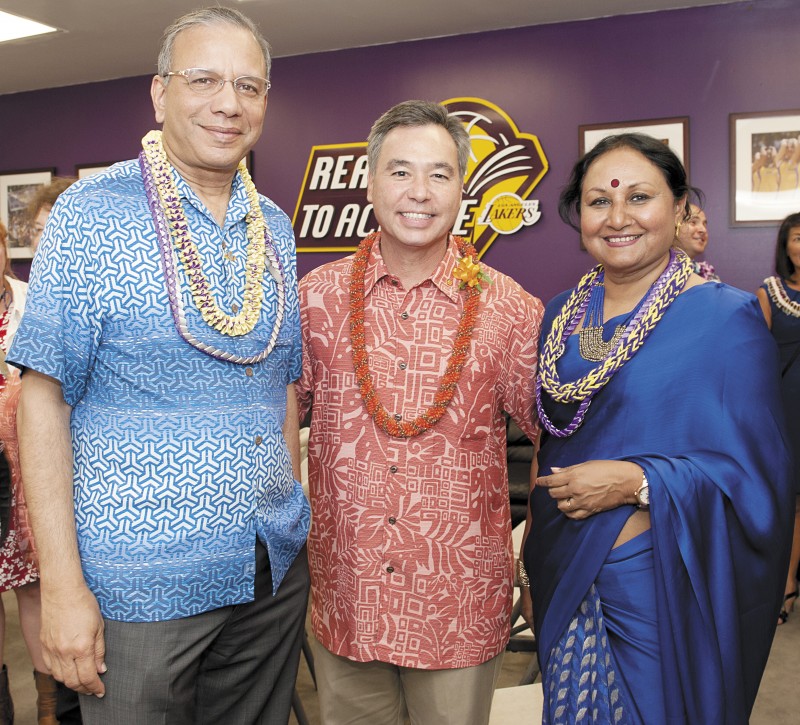
From left to right:
Rotary International President K. R. “Ravi” Ravindran, Rotary District Governor Hawaii Del Green, and Mrs. Vanathy Ravindran. Photo by Nathalie Walker.
So how does a simple man from an island nation off the coast of India rise to the head of an organization that has counted such luminaries such as President Warren Harding, author Thomas Mann and Dr. Charles Mayo as members?
It all began in the tea fields of Sri Lanka, where his grandfather raised Ceylon tea, some of the best tea in the world. Their fields were on a mountainside, a mile up from the island’s pristine beaches, the landscape dotted with elephants and sound-tracked by waterfalls.
Life was good for the Ravindran family — until the socialist government took over in 1972 and stripped the family of their land and resources. Their paradise was gone, and the young Ravindran needed a way to make a living.
So a young man adrift in the world looked to a group that had helped his father and grandfather find their way: Rotary.
“They had very high philosophies and principles, and I was just 21 and starting a job, and I joined it for fun, for friendship. I was leading a lonely life on the plantations in the mountains,” remembers Ravindran.
The organization helped him make the connections he would need to begin his new venture: tea bag manufacturing.
“It all gets shipped out of Sri Lanka in tea chests or big sacks, and I realized that no one drinks tea out of a chest,” says Ravindran. “So I decided to set up high-quality packaging because then maybe the business would start going to Sri Lanka, and that is exactly what happened; it just was the right time for the right thing, no great credit to me. I have no false illusions about myself — I am just an ordinary guy.”
Despite his humbleness, the company, Printcare, has grown to be one of the biggest manufacturers of tea bags in the world, but it would never even have cranked out its first bag if it were not for the connections he made at the club.
“When I started my business, I went to many banks, and they all wanted security and I was not in a position to give it to them,” says Ravindran. “But I went into one bank and the banker was a Rotarian, and he said he would trust me because I was a Rotarian.”
These business connections are important, but the real work of the Rotary is done in helping others.
“In business, everyone can make money; that is not a big deal,” says Ravindran. “But when you leave a place, you should leave such a big hole in the community that they are dying to have you back. It is not enough to just make money; the community around you does not benefit because you are there. Instead, we build schools, we give jobs to the kids, even building toilets, because many girls stop going to schools because there are no proper toilet facilities. So even by just building toilets we allow girls to continue their education.”
Each Rotary Club has its own focus. Here in Hawaii, Rotarians are helping rebuild a youth center, in India they are focused on literacy, and in Africa they are working to get people clean water and stop the spread of AIDS. But there is one overarching cause to which they are all committed: the eradication of polio.
According to Ravindran, this goal may be achieved by the end of this year, as they look to root it out of the last three countries suffering from it: Pakistan, Afghanistan and Nigeria. He was at the forefront of its eradication in Sri Lanka, even going so far as negotiating with Liberation Tigers of Tamil Eelam in the early ’90s to allow immunizations.
“We persuaded the militants to have a ceasefire for two days so we could do this — they said if the government would agree then they would agree,” says Ravindran. “We had a problem because if we were linked to the militants then we would go to jail, but they sent us a letter, I do not know how we got it, that said, ‘Our war is not with children,’ and we immunized millions during those Days of Tranquility.”
Polio is now a thing of the past in Sri Lanka, but the Rotarian work continues, though they have seen a decline in membership in recent years, as have all service organizations. Ravindran believes that is not because of people’s hearts changing, but the longer commitments people have to give to work and the increased connectivity provided by the Internet from sites like LinkedIn and Facebook that allow business connections to happen without getting together at a civic club.
But while the importance of business connections may have lessened, there is still a world of people who need a helping hand.
“There is a role for people who are service-minded,” says Ravindran. “This allows you to step outside of your own self for a day or a week. Not everyone can be a Martin Luther King Jr. or a Mother Teresa, but if you join Rotary you can be a Mother Teresa for one day.”

